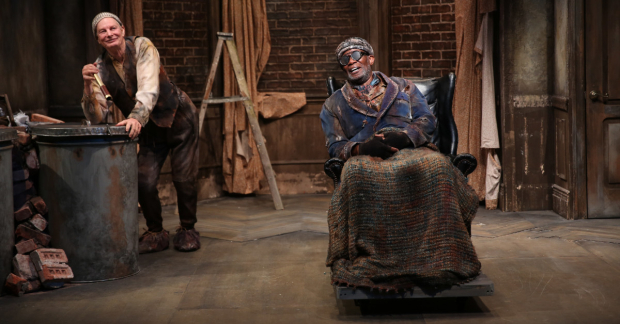Interview: John Douglas Thompson Talks About Acting in the Dark in Samuel Beckett's Endgame
Thompson is joined by Bill Irwin in Irish Repertory’s production of the modern classic.
Even though he's confined to a chair for the entirety of Samuel Beckett's Endgame, John Douglas Thompson commands attention. The award-winning actor — whose stage roles have ranged from Othello to Louis Armstrong, and who has recently appeared onscreen in the film Till and the HBO series The Gilded Age — finds shreds of humanity and piles of humor in the cruel, controlling Hamm, the blind and disabled old man who bellows at his put-upon servant, Clov, played by the great physical comedian Bill Irwin, in Irish Rep's revival of the 1957 drama.
After sharing an off-Broadway stage with Sam Waterston in King Lear 12 years ago, Thompson and Irwin (who played Kent and the Fool, respectively) had been looking for another opportunity to work together. Their schedules finally coincided, and the timing seemed right for Beckett's absurdist take on survival against the odds, directed by Ciarán O'Reilly and featuring Joe Grifasi and Patrice Johnson Chevannes as Hamm's garbage-can-bound parents.
The day of Endgame's opening night, Thompson talked about his latest role (which he performs sightless onstage), why he wasn't going to read the reviews, and more.

(© Carol Rosegg)
The following conversation has been condensed and edited for clarity.
You're onstage for the entire 90 minutes, and you can't leave your chair. How challenging is that?
I have to make sure that I don't have to pee. [laughs] It's quite challenging. Most of the work I've done, I've been able to use a physical vocabulary of movement to help construct a character. At this I really don't have that. It's challenging but also quite interesting.
How much can you see out of the glasses you wear?
Not at all. I purposely started working on this totally blind in rehearsal. We taped [the glasses], so I can't see out of the sides. There is a little bit of space on the bridge. Sometimes I can see things going on in front of me, but I can't make out what they are. I wanted to do that just to really use my other senses onstage. Any sense of touch, smell, sound — those are heightened for me.
That sounds a bit scary.
It is, but I'm glad I approach it that way. The other challenge is when I'm performing, I'm used to being able to see the audience and connect with them. I don't have that. But those are also the confinements of the character — he's a disabled individual who's blind and that is his world — and I wanted to try to make that as much as possible my world in exploring and performing the part.
Do you approach playing Hamm differently than you would a Shakespeare character?
No, I think acting is acting. How the work comes out is different because you're working with a different playwright. For me it's trying to find, with every play, some kind of personal connection. A play like this, we worked really hard as a group to establish a family: the parents, Hamm, and Clov, the surrogate son. Then we're dealing with some kind of extinction-level event that has happened outside of this bunker — you can [think] Covid, climate change — and trying to live through that and get to the other end. It's almost like what Beckett presented as a surreal situation is becoming more and more real.
And yet the night I saw it there was a lot of laughter in the audience.
I never found Samuel Beckett to be dour or bleak because in the midst of the bleak situation he's got people who want to move forward. A part of the human spirit is our ability to move forward, look at what's coming next, make what's coming next better than what has come before.
Do you read the reviews when they come out, or do you not pay attention to them?
More than other things I've done, there is an elusive quality to this, which I like. I want to enjoy that experience and not have to be thinking about what critics might say because they interfere with the experience I'm having. The process is never over, even when the play closes you're still like, "Oh, I could have done this" and "Oh, that moment there, now I understand what it is." I understand what critics have to do is come, look at a show, tell the public about the show, but as a performer I'm looking for an experience that's quite wide open. When a critic critiques a performance it's kind of a closed thing.









